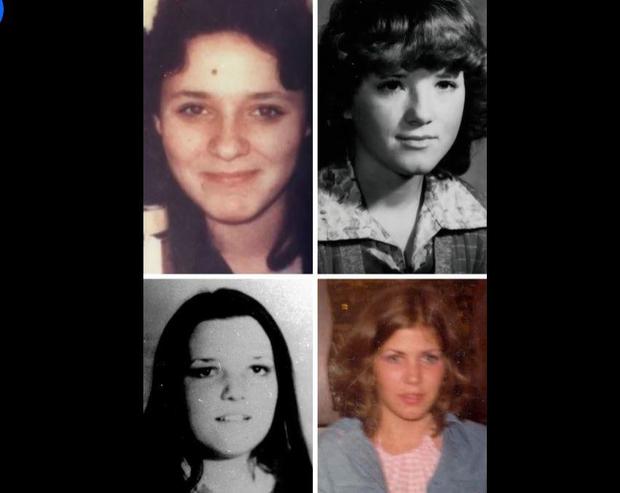Murders of 2 girls and 2 young women in Canada in the 1970s linked to American serial rapist
Canadian police announced Friday they have linked the deaths of two 14-year-old girls and two young women nearly 50 years ago to a now deceased U.S. fugitive who hid in Canada from the mid 1970s to the late 1990s.
Alberta Royal Canadian Mounted Police Supt. Dave Hall said Friday that Gary Allen Srery might also be linked to other unsolved murders and sexual assaults in Western Canada and authorities are asking the public for more information that may link him to other unsolved cases.
"We are now announcing that we have linked four previously unsolved homicides from the 1970s to a now deceased serial, sexual offender," Hall said at a press conference in Edmonton, Alberta.
Police released a video on social media about the four women while appealing for tips from the public.
Srery died in 2011 in a state prison in Idaho while serving a life sentence for rape.
Hall said Srery was identified through the use of DNA and criminal databases that helped trace his family tree.
Hall said in 1976, Eva Dvorak and Patricia McQueen were both 14-year-olds living in Calgary, Alberta, attending junior high. He said they were last seen walking together in downtown Calgary and said the following day their bodies were found lying on the road under a highway underpass west of the city.
He said 20-year-old Melissa Rehorek moved to Calgary from Ontario for new opportunities in the spring of 1976. He said at the time of her death, she was a housekeeper living at the downtown YMCA in downtown Calgary and was last seen by a roommate before she went hitchhiking. Hall said the following day her body was located in a ditch in a township west of Calgary.
Hall said in 1977, Barbara MacLean was a 19-year-old Calgary resident from Nova Scotia who moved west only six months prior. Hall said MacLean worked at a local bank and was last seen leaving a hotel bar. He said her body was found six hours later just outside Calgary.
Hall said authorities at the time didn't come up with a cause of death for the two 14-year-olds but said Rehorek and MacLean's deaths were attributed to strangulation.
Hall said although semen from all four crime scenes was collected at the time, but the technology did not exist at the time to develop profile DNA.
"Were Srery alive today he would be 81 years old," Hall said.
In a statement obtained by the Calgary Herald, McQueen's family said in part: "This evil monster has caused so much pain and suffering for countless families. He took a piece of every one of us when he took our loved ones. We thank god that he is no longer alive and can never harm anyone else again."
Alberta RCMP Insp. Breanne Brown said Srery had an extensive criminal record including forcible rape, kidnapping and burglary when he fled to Canada from California in 1974. He lived in Canada illegally until his arrest for sexual assault in New Westminster, British Columbia in 1998, she said.
Brown said Srery used nine different aliases in his lifetime and frequently changed his appearance, residence and vehicles. She said he obtained illegal identification and social assistance through aliases and lived a transient lifestyle while occasionally working as a cook in Calgary from 1974 to 1979 and then in the area of Vancouver, British Columbia, from 1979 until his arrest and conviction of sexual assault in New Westminster in 1998.
Brown said Srery was deported to the U.S. in 2003 where he was convicted in Idaho for sexually motivated crimes and sentenced to life in prison.
At his sentencing in 2009, one of Srery's victims gave emotional testimony and demanded that he look at her while she spoke in court, the Spokesman Review reported.
"You have made me have a stroke, because of the stress and the damage that you did to me in that bathroom. Do you understand me? A stroke, that caused irreversible damage to my complete left side," she said in court, according to the newspaper. "You damaged me … and I can't be repaired. There has got to be a lifetime sentence for you, just as I'm having to pay a lifetime sentence for no wrongdoing."
Srery died in prison in 2011.
"We know that Srery's criminality spanned decades over multiple jurisdictions and numerous aliases. The Alberta RCMP believes there are more victims and we are asking the public to assist in further S's timeline in Canada," Brown said.
"It is particularly concerning that Srery appears to have no meaningful contact with law enforcement agencies within Canada since he entered the country illegally in mid-1970s until he was arrested, charged and convicted for the New Westminster assault in 1998."






